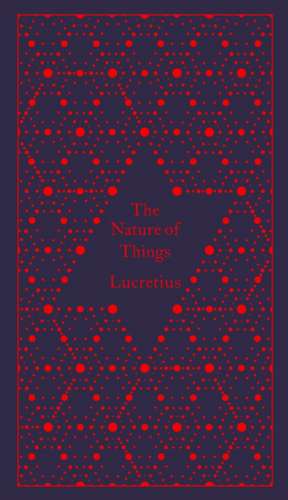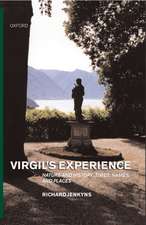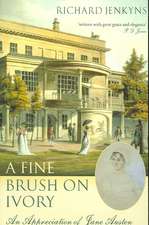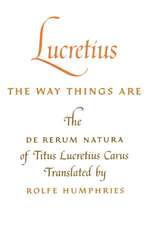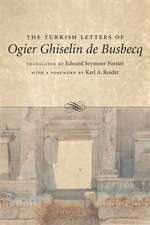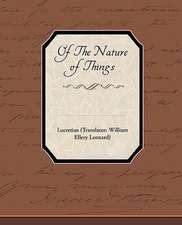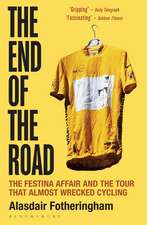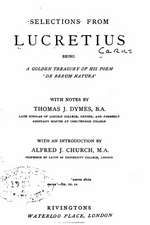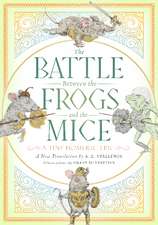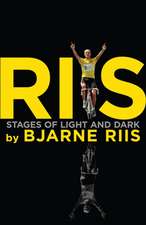The Nature of Things: Penguin Pocket Hardbacks
Autor Lucretius Introducere de Richard Jenkyns Traducere de A. E. Stallingsen Limba Engleză Hardback – 4 feb 2015
Lucretius' poemOn the Nature of Thingscombines a scientific and philosophical treatise with some of the greatest poetry ever written. With intense moral fervour he demonstrates to humanity that in death there is nothing to fear since the soul is mortal, and the world and everything in it is governed by the mechanical laws of nature and not by gods; and that by believing this men can live in peace of mind and happiness. He bases this on the atomic theory expounded by the Greek philosopher Epicurus, and continues with an examination of sensation, sex, cosmology, meteorology, and geology, all of these subjects made more attractive by the poetry with which he illustrates them.
| Toate formatele și edițiile | Preț | Express |
|---|---|---|
| Paperback (2) | 69.94 lei 22-36 zile | +10.25 lei 5-11 zile |
| Penguin Books – 25 iul 2007 | 69.94 lei 22-36 zile | +10.25 lei 5-11 zile |
| Simon & Brown – 31 ian 2012 | 149.94 lei 38-44 zile | |
| Hardback (2) | 81.47 lei 25-31 zile | +31.49 lei 5-11 zile |
| Penguin Books – 4 feb 2015 | 81.47 lei 25-31 zile | +31.49 lei 5-11 zile |
| – | 203.35 lei 38-44 zile |
Preț: 81.47 lei
Preț vechi: 96.16 lei
-15% Nou
Puncte Express: 122
Preț estimativ în valută:
15.59€ • 16.32$ • 12.90£
15.59€ • 16.32$ • 12.90£
Carte disponibilă
Livrare economică 20-26 martie
Livrare express 28 februarie-06 martie pentru 41.48 lei
Preluare comenzi: 021 569.72.76
Specificații
ISBN-13: 9780141396903
ISBN-10: 0141396903
Pagini: 480
Dimensiuni: 113 x 174 x 33 mm
Greutate: 0.41 kg
Editura: Penguin Books
Colecția Penguin Classics
Seria Penguin Pocket Hardbacks
Locul publicării:London, United Kingdom
ISBN-10: 0141396903
Pagini: 480
Dimensiuni: 113 x 174 x 33 mm
Greutate: 0.41 kg
Editura: Penguin Books
Colecția Penguin Classics
Seria Penguin Pocket Hardbacks
Locul publicării:London, United Kingdom
Notă biografică
Titus
Lucretius
Carus
(who
diedc.50
BC)
was
an
Epicurean
poet
writing
in
the
middle
years
of
the
first
century
BC.
His
six-book
Latin
hexameter
poemDe
rerum
naturasurvives
virtually
intact,
although
it
is
disputed
whether
he
lived
to
put
the
finishing
touches
to
it.
As
well
as
being
a
pioneering
figure
in
the
history
of
philosophical
poetry,
Lucretius
has
come
to
be
our
primary
source
of
information
on
Epicurean
physics,
the
official
topic
of
his
poem.
A. E. Stallings was born in 1968. She grew up in Decatur, GA, and was educated at the University of Georgia and Oxford University in classics. Her poetry has appeared inThe Best American Poetry(1994 and 2000) and has received numerous awards, including a Pushcart Prize (Pushcart Prize Anthology XXII), the 1997 Eunice Tietjens Prize fromPoetryand the third annual James Dickey Prize fromFive Points.
Richard Jenkyns is Professor of the Classical Tradition, University of Oxford, a Fellow of Lady Margaret Hall and author of a number of books includingDignity and Decadence: Some Classical Aspects of Victorian Art and ArchitectureandThe Victorians and Ancient Greece.
A. E. Stallings was born in 1968. She grew up in Decatur, GA, and was educated at the University of Georgia and Oxford University in classics. Her poetry has appeared inThe Best American Poetry(1994 and 2000) and has received numerous awards, including a Pushcart Prize (Pushcart Prize Anthology XXII), the 1997 Eunice Tietjens Prize fromPoetryand the third annual James Dickey Prize fromFive Points.
Richard Jenkyns is Professor of the Classical Tradition, University of Oxford, a Fellow of Lady Margaret Hall and author of a number of books includingDignity and Decadence: Some Classical Aspects of Victorian Art and ArchitectureandThe Victorians and Ancient Greece.
Recenzii
One
of
the
most
extraordinary
classical
translations
of
recent
times
A.E. Stallings's brilliant recent translation
A.E. Stallings's brilliant recent translation
Descriere
Descriere de la o altă ediție sau format:
A poem that demonstrates to humanity that in death there is nothing to fear since the soul is mortal, and the world and everything in it is governed by the mechanical laws of nature and not by gods; and that by believing this men can live in peace of mind and happiness.
A poem that demonstrates to humanity that in death there is nothing to fear since the soul is mortal, and the world and everything in it is governed by the mechanical laws of nature and not by gods; and that by believing this men can live in peace of mind and happiness.
